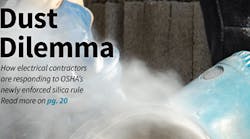If you've worked with many solvents or other chemicals on the job, you've seen a Material Safety Data Sheet (MSDS). If you haven't seen an MSDS for each chemical, there's a deficiency in your company's safety program. Seeing and understanding aren't the same thing, though. Unfortunately, an MSDS can have an "eyes-glaze-over" effect if you don't know how to use it to get the information you need.
So, let's get a grip on what that MSDS actually is. The first thing to understand is it's a structured report. That structure consists of seven sections, each with a specific purpose. For many chemicals you might use, one or more of those sections will contain "N/A" instead of having information. This doesn't mean the MSDS is incomplete. It means that section doesn't apply to the chemical you're using. In our next issue, we'll start looking at the sections of an MSDS.


